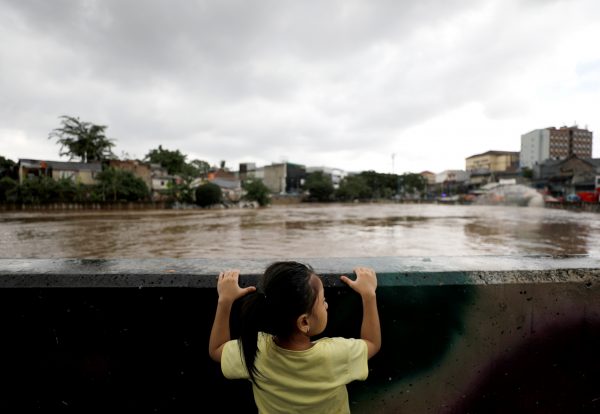But some Indonesian cities perform better than others in managing the deadly risk of urban flooding, even if important conditions such as geography and rainfall pattern are roughly the same. Surprisingly, cities that do not invest heavily in massive technological interventions do just as well or even better than cities that depend on such interventions.
Beyond the engineering and infrastructure domains, existing power structures and ongoing political processes play a crucial role in shaping a city’s ability to cope with floods.
Indonesian public officials usually blame their poor flood management on the intensity of rainfall, which has been exacerbated by climate change. They argue that existing pumping machines, embankment walls, retention ponds and drainage canals are unable to handle the overflow of surface water due to extreme rains. While the failure of flood management in some cities might be impacted by non-political factors such as infrastructure or machine failure, the political dimensions of flood management practices play a large part in three Javanese cities — Surabaya, Semarang and Bandung District.
Flood defence infrastructure in Indonesia relies on public and private drainage systems and waterways to maintain surface water flow, minimising the overflow that leads to flood hazards. In Indonesia, local governments have the authority to manage drainage channels built by private entities, a fundamental element of flood defence infrastructure, to ensure the optimal operation of the city’s drainage network.
Even though the local governments in Surabaya, Semarang and Bandung District have the same authority in operating flood defence infrastructure, the outcomes are varied, as shown by their respective number of flood cases and the number of impacted people in each city. Surabaya performs impressively, while Semarang and Bandung District perform less well despite being equipped with numerous large infrastructure projects.
The success or failure of flood management depends on the capacity of local governments to set up and implement effective flood defence infrastructure regulations. Local governments whose policies are regularly undermined by collusive relationships between state actors and economic elites build less effective flood defences, especially through the management of drainage channels and waterways. Local governments that are able to tame or bypass such collusive relationships are better at building effective flood defences.
The local governments in Surabaya, Semarang and Bandung District apply different policies in implementing and enforcing regulations relating to the usage of drainage channels. Regulatory capacity is influenced by the extent to which the local political situation is conducive to predatory collusion between authorities and business actors. The more regular collusion that allows for drainage law violations to occur is, the less successful the flood management outcomes will be.
Where collusion occurs less frequently, flood management is more successful. In Surabaya, where state–society linkages are progressive, the local political character supports a strong enforcement of drainage regulation. Regions with less progressive state–society linkages such as Semarang and Bandung District show weak regulatory enforcement.
A good relationship between local government and civil society is crucial to enforce flood defence regulations. Where civil society is engaged in local governance, the government apparatus cannot easily collude with companies violating drainage regulations. And a government that is receptive to a broader popular base can be more responsive to the needs of a larger segment of society.
In the case of Surabaya, former mayor Tri Rismaharini mobilised against corruption by strengthening relationships with civil society actors including NGOs, universities and reformist leaders as well as the media. This reform agenda resulted in a more effective, more just and less expensive flood response. This coalition also limited the influence of predatory elites until Rismaharini left office in 2020.
Flooding is not merely a natural event but also the result of polity and policies. The success or failure of flood management depends on the local government’s firmness in overcoming inequality in drainage system usage. The local government must be fully committed to upholding social justice in flood management and should provide firm support to street-level bureaucrats so that they can enforce rules, even against privileged and influential groups. Flood management is most effective when government leaders have a strong political commitment against corruption and solid civil society supports.
Yogi Setya Permana is a PhD Researcher at the Royal Netherlands Institute of Southeast Asian and Caribbean Studies, Leiden University.
This article is based on a paper which will be presented at the upcoming 2023 ANU Indonesia Update: Governing Urban Indonesia. The conference will explore the challenges and politics of Indonesia’s urban transformation. To attend in-person or online, go to https://bit.ly/update40.


Fantastic observations Pak Yogi. So there are elections in 2024. I trust that parties see your conclusions, and make sure their candidates for local office have good policies for flood management, with good policies for resisting elites and working with civil society. And I trust civil society will see your conclusions.